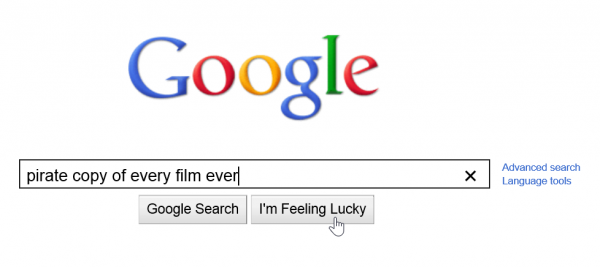Motion Picture Association of America blames Google for online piracy

Piracy is a problem, a big problem. A few days ago I wrote about the consequences of piracy and the fact that it is far more than just the copyright holder who is affected. While I believe that piracy should be viewed as something other than theft, it is obviously still wrong. The label "wrong" sounds almost belittling, but there are few people who would deny it is an issue that needs to be tackled.
The obvious targets when cracking down on piracy are the people who are illegally downloading music, movies and software they are not entitled to, but this does not really nip things in the bud. Piracy is a very complex issue, and as with any complex issue a scapegoat is needed. The Motion Picture Association of America is understandably keen on stemming the flow of illegally downloaded films and it is pinning the blame, at least partly, on Google.
The MPAA commissioned research into how web searches lead to the discovery of pirated content to see whether algorithm changes implemented by Google last year were proving effective. The findings make for interesting reading, but one thing is clear -- the MPAA doesn’t think Google et al are doing enough. Google in particular finds itself in the crosshairs as the research found that 82% of web searches that lead to copyright infringing material came from Google.
This in itself is not surprising in the least. Google is the biggest search engine. Pick any topic -- porn, MP3, illegal movie copies, torrents, software cracks -- and just by virtue of being the world's largest and most popular search engine, it is highly probable that most traffic comes via Google. But does this matter? The fact that Google can be used to find illegal content is just an unfortunate "side effect", isn’t it… in much the same way that a library could be used to discover interesting ways to poison an enemy without detection?
But the MPAA feels that Google should be doing more. The organization points out that 58 percent of searches that include illegal content in the results do not include obvious terms to track down such content -- in many cases just searching for the name of a TV show is enough to reveal the location of downloadable copies. The report, entitled Understanding the Role of Search in Online Piracy, doesn’t just single out Google -- it does make passing reference to Bing, Yahoo and "others" -- but the search giant is clearly the MPAA's main target.
Google has spoken out several times in the past, and this month has published a report of its own: "How Google Fights Piracy". The company is especially keen to point out that it believes that search engines in general (and Google specifically) are not key factors in driving traffic to sites that either host or provide access to pirate material; in fact, big name torrent sites have said that only a small proportion of traffic comes via Google.
This is not to say Google is not taking steps against piracy but, as stated in the report, "search engines do not control what content is on the web." The search giant has made changes to the way it works so that terms closely associated with piracy do not feature in suggested results of autocomplete lists. Google also pushes some sites further down the list of results -- or "makes legitimate alternatives more visible" in its words.
Certain sites can be filtered from search results, but this is done retroactively. Sites that are removed are under investigation following a removal request. There have to be investigations because site reporting is open to abuse, and Google "reject bogus infringement allegations, such as removals for political or competitive reasons." Details of removal requests are even published for all to see.
Is it right to demand that Google do more? I don’t think so. Mock the "don't be evil" motto as much as you like but Google's heart is, generally speaking, in the right place. The MPAA should take some responsibility itself. The existence of sites offering illegal content is not Google's fault -- it is a product of an industry that demands more and more money of consumers. Find new, innovative, flexible and cheap ways for consumers to access the content they want, and piracy will be reduced. It really is that simple.
Piracy will never be eliminated. However cheap something is made, the prospect of getting something for free will be too much for some people to resist. There will always be some degree of piracy -- the MPAA needs to accept this. It also needs to accept that it can itself do more -- in conjunction with the movie studios it represents -- to help reduce the problem. Education and price are key areas for attention.
Google is a tool, and tools can be misused. Google may do no evil, but that does not mean it cannot be used for evil. A breadknife is another tool -- one designed with a perfectly innocent purpose in mind, but one that can also be used for more nefarious things. When there is a fatal stabbing -- something that happens with worrying frequency -- there are not calls for knife manufacturers to make their products safer or to start running programs to educate consumers about safe knife use. Why should Google be treated any differently?
So long as the search engine is not actively promoting piracy, there is a limit to the level of responsibility the company can be expected to have for how its tools are used. It is not reasonable to expect Google to police the internet. Even responding to complaints the company receives (57 million pages were the subject of removal requests in 2012) is an absurdly large job. The number of man-hours involved is incredible.
The MPAA shouldn’t expect other people to fix its problem for it.